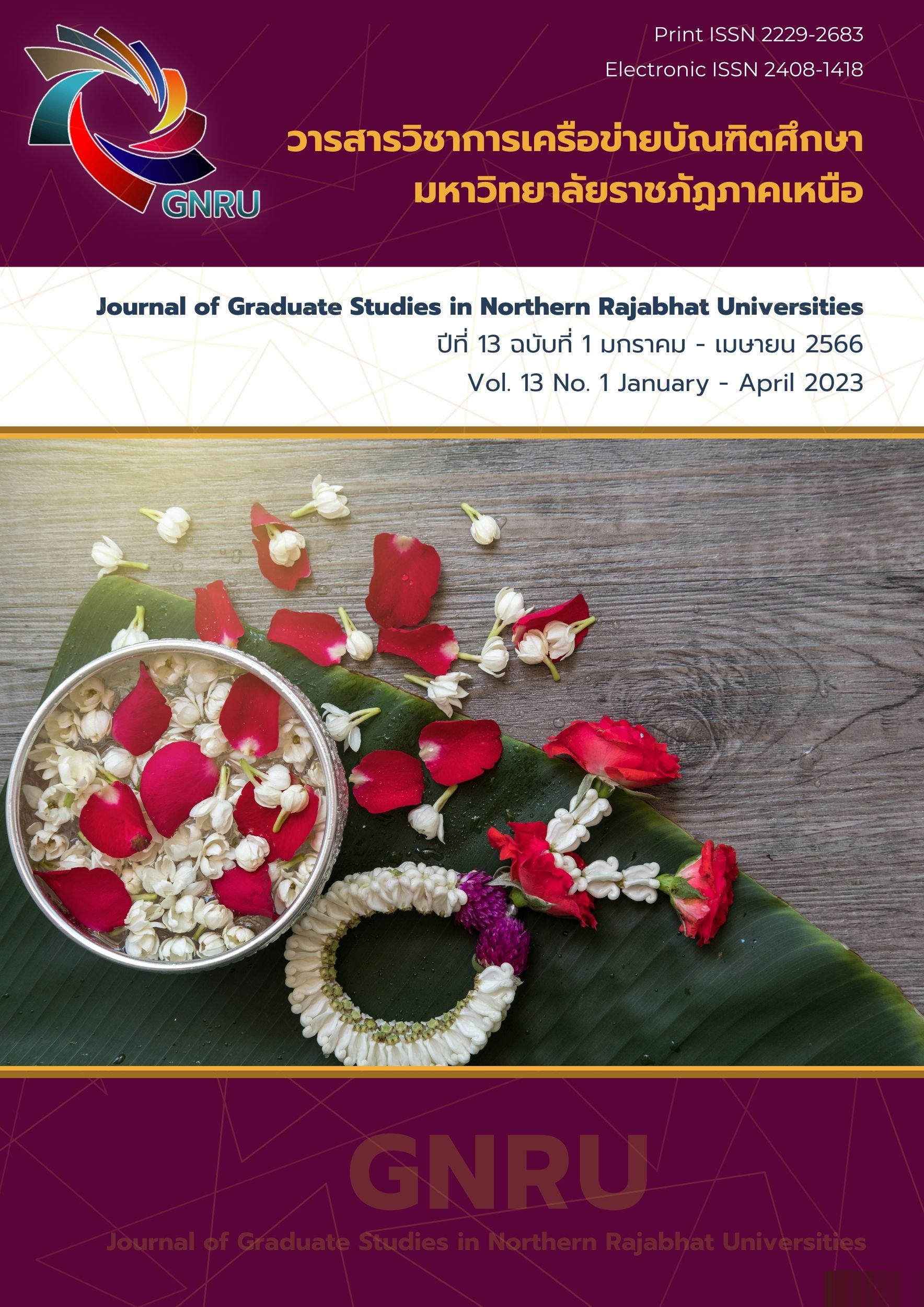The Development of Model of Online Learning Using Self-Regulated Learning Strategy and Analytical Thinking Process of Undergraduate Students
Main Article Content
Abstract
This present research aimed to (1) develop a model of online learning using self-regulated strategy and analytical thinking process of the undergraduate students, and (2) study results of using the model of online learning using self-regulated strategy and analytical thinking process of the undergraduate students. The samples included 119 of 2nd year undergraduate students, majoring in Education, School of Education, University of Phayao who enrolled in the course 161211 Communication and Digital technology in Education in the first semester, academic year 2021. They were selected purposively.
The results indicated that 1) there were 4 steps of developing model of online learning
and the level of suitability was high, 2) the results of the study of utilizing the model of online learning can be concluded accordingly: (2.1) the overall results of the undergraduate student’s self-regulated leaning was high, (2.2) the comparative study of pretest and posttest scores of the undergraduate students showed that the posttest scores were higher than that of the pretest at the level of statistical significance .05, and (2.3) the results of the comparing the analytical thinking scores with the set criteria of 70 % was that the undergraduate students gained the post study scores higher than 70% of the total scores at the level of statistical significance .05.
Article Details
References
กระทรวงดิจิทัลเศรษฐกิจและสังคม. (2563). รายงานผลการสำรวจพฤติกรรมการใช้อินเทอร์เน็ตในประเทศไทย ปี 2563. กระทรวงดิจิทัลเศรษฐกิจและสังคม.
จักรกฤษณ์ โพดาพล. (2563, 9 ตุลาคม). การจัดการเรียนรู้ออนไลน์: วีถีที่เป็นไปทางการศึกษา. http://slc.mbu.ac.th/wp-content/uploads/2020/06/การจัดการเรียนรู้ออนไลน์-ดร.จักรกฤษณ์-โพด.pdf.
ชุติมา วัฒนะคีรี. (2561). ความสามารถในการคิดวิเคราะห์ของนิสิตระดับปริญญาตรี มหาวิทยาลัยราชพฤกษ์. วารสารมนุษยศาสตร์และสังคมศาสตร์ มหาวิทยาลัยราชพฤกษ์, 4(1), 101-110.
ทาริกา สมพงษ์. (2563). การพัฒนาชุดกิจกรรมการเรียนรู้โดยการกำกับตนเอง เรื่อง ชนิดและหน้าที่ของคำ กลุ่มสาระการเรียนรู้ภาษาไทย สำหรับนักเรียนชั้นมัธยมศึกษาปีที่ 1. [วิทยานิพนธ์ปริญญาโท, มหาวิทยาลัยราชภัฏสกลนคร}. ฐานข้อมูลงานวิจัย (ThaiLis).
นพมาศ ปลัดกอง. (2562). การพัฒนาการเรียนรู้ด้วยการนำตนเองของผู้เรียนในระบบการศึกษาทางไกลโดยใช้รูปแบบการจัดการเรียนรู้ด้วยเทคนิคนั่งร้านเสริมเรียนรู้. [ปริญญานิพนธ์ปริญญาเอก, มหาวิทยาลัยศรีนครินทรวิโรฒ]http://bsris.swu.ac.th/thesis/58199150039AP8992555f.pdf
ปรีดา นวลรักษา และอัมพร กุลาเพ็ญ. (2565). การพัฒนาทักษะกระบวนการคิดเชิงวิเคราะห์ 5 ขั้นตอน สำหรับนักศึกษาชั้นปีที่ 3 สาขาวิชาการประถมศึกษา มหาวิทยาลัยมหามกุฏราชวิทยาลัย
วิทยาเขตร้อยเอ็ด. วารสารวนัมฎองแหรกพุทธศาสตรปริทรรศน์, 9(1), 69-88.
สรพงค์ สุขเกษม. (2560). การพัฒนารูปแบบการเรียนการสอนแบบผสมผสาน รายวิชาคอมพิวเตอร์สารสนเทศขั้นพื้นฐาน สำหรับนิสิตระดับปริญญาตรี. [วิทยานิพนธ์ปริญญาเอก, มหาวิทยาลัยนเรศวร]. ฐานข้อมูลงานวิจัย (ThaiLis).
สถาบันบัณฑิตพัฒนบริหารศาสตร์. (2563, 9 ตุลาคม). เรียนออนไลน์. https://nidapoll.nida.ac.th/survey_detail?survey_id=45
มหาวิทยาลัยอัสสัมชัญ. (2563, 9 ตุลาคม). เอยูโพล: การเรียนออนไลน์ในสถานการณ์ Covid-19. https://www.ryt9.com/s/abcp/3134816
Andrew, H. (2019). The Importance of Anytime Anywhere Learning in The Modern Workplace. https://elearningindustry.com/anytime-anywhere-learning-modern-workplace-importance.
Bloom, B. S. (1961). Taxonomy of Educational Objectives. David Mckey.
Dick, W., Carey, L., and Carey, J. O. (2001). The systematic design of instruction (5th ed.). Pearson Education.
Gagne, R.M. (1985). The conditions of learning. Holt, Rinehart and Winston.
Gerlach, V.S., and Ely, D.P. (1980). Teaching & Media: A Systematic Approach (2nd ed.). Prentice-Hall.
Heinich, R. et al. (1996). Instructional Media and Technologies for Learning. Prentice Hall.
Kemp JE., Morrison GR. and Ross SM. (1994). Designing Effective Instruction. Macmillan College.
Kibler, Robert J. (1974). Behavioral Objectives and Instructional Process. McCutchan.
Macneil, C. (2001). The supervisor as a facilitator of informal learning in work teams. Journal of Workplace Learning, 13(6), 246-253.
Pintrich, R, P. and De-Groot, E, V. (1990). Motivational and Self-Regulated Learning Components of Classroom Academic Performance. Journal of Education Psychology, 8(1), 33-40.
Zimmerman, B, J. (1989). A Social Cognitive View of Self-Regulated Academic Learning. Journal of Educational Psychology, 81(3), 329-339.


